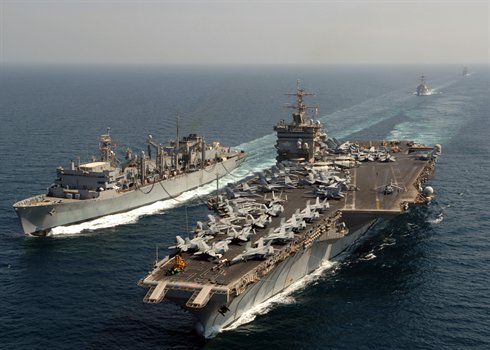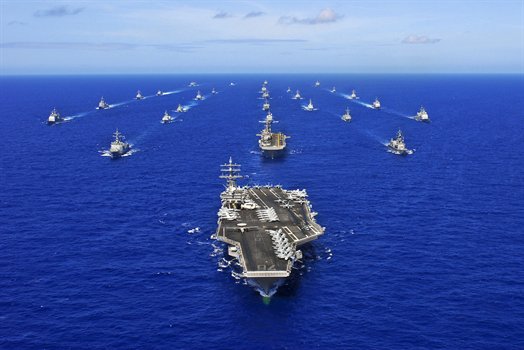Those with a hand in crafting US foreign policy are always more explicit about their strategies than those in the servile political and pundit classes who have a bullhorn to the ear of the American public. The result of this is that the public are under grand delusions about what motivates US foreign policy. It’s far easier to listen to a speech from your district’s representative or to what Bill O’Reilly screams about than to actually attempt to understand policy from those who implement it.
Take, for example, a piece in the most recent issue of Foreign Affairs, the main establishment journal, by Andrew Krepinevich, a West Point graduate with a PhD. from Harvard who has served on the personal staff of three Defense Secretaries and now heads the Center for Strategic and Budgetary Assessments think-tank. Here is a key sentence:
The challenges that China and Iran pose for U.S. security lie not in the threat of traditional cross-border invasions but in efforts to establish spheres of influence in, and ultimately to control access to, critically important regions.
Now, if that is how most Americans understand the supposed top two greatest threats the country faces, I’ll eat my foot. What the public sees constantly streaming on television, across headlines, and rushing out of politicians mouths is that Iran and China are outlaw states that are threats to the security of Americans. And that’s why polling generally shows Americans are troubled by these two threats.
Krepinevich’s piece is subtitled “Why the Pentagon Should Focus on Assuring Access.” The last word there is important. US foreign policy centers around “access.” The threat to the US emanating from China and Iran is not that they will attack us – that is a virtual impossibility. Rather, it is that those states will “establish spheres of influence” and therefore deny US military “access.”
These are referred to in Pentagon parlance as “anti-access” or “area-denial” scenarios. A Department of Defense paper that was released last January focused on the potential increase of these scenarios going forward. It said, “the United States must maintain the credible capability to project military force into any region of the world in support of [its] interests.” Notice the technocratic description of empire. The notion that any state or non-state actor would dare deny America military access to their territory is patently unacceptable.
This is the mindset that informed the Carter Doctrine – literally the cornerstone of US foreign policy in the Middle East, which colored every policy and perspective on the region since its induction in Carter’s State of the Union address in January 1980. “An attempt by any outside force to gain control of the Persian Gulf region,” Carter declared, “will be regarded as an assault on the vital interests of the United States of America, and such an assault will be repelled by any means necessary, including military force.”
Suddenly America began to consider the Middle East part of its own territory. Any move by any state to gain influence in that region will be regarded as an “assault” on the United States worthy of military action in – they regard it – self-defense.
And thus the threat from Iran is not the status of their nuclear program per se, but rather its rising influence and how it might impact US control of Persian Gulf oil. A secret memo written in 1982 to the National Security Council regarding the threat from Iran put it succinctly, arguing that “whoever is in control of the Gulf’s” oil, “is in a position to have a very large political as well as economic influence in the world.”
You can see this strategy now playing out in the Asia-Pacific region as well, due to China’s rising influence. Not long before Obama announced his “Asia Pivot” strategy of surging US military presence throughout the region in order to contain China, then-Defense Secretary Robert Gates spoke at an International Institute for Strategic Studies meeting in Singapore and argued for “sustaining a robust [US] military presence in Asia.” He spoke of overcoming “anti-access and area denial scenarios” that the US military faces in Asia, which threatens America’s access to strategic markets and resources.
China represents a threat to the professional statists in Washington who benefit from having dominion over the world. Unless the Pentagon can span the entire globe at will with little or no resistance, it is a loss for them.
But Americans don’t understand it this way. They see Iran and China as a threat to their personal security. If only they could get beyond political soapboxes and Bill O’Reilly.




